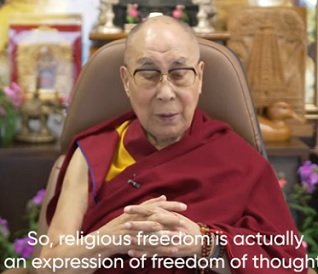| "Three things cannot be long hidden: the sun, the moon, and the truth." Gautama Buddha |
Because of China’s illegal occupation, the people of Tibet have lost the right to determine their own destiny. But forced into exile, the Dalai Lama has become a compassionate leader for the world and a source of endless inspiration to resolve the Tibet-China conflict.
When Xi Jinping took over as China’s top leader in 2012, there were hopes that his reputation as a moderate and his father’s relationship with the Dalai Lama would lead to a softening of policies. Instead, Xi has proven to be a hardliner whose indefinite rule began this past month, unforeseen a decade ago.
 By controlling Tibet’s environment, China controls life not just for Tibetans—but for the nearly 2 billion people across Asia that depend on Tibet’s water, land, and other resources. China is constructing massive dams on Tibetan rivers at an unprecedented pace. This weaponization of water and pollution from construction threatens nearly two billion people across Asia who depend on Tibet’s water.
By controlling Tibet’s environment, China controls life not just for Tibetans—but for the nearly 2 billion people across Asia that depend on Tibet’s water, land, and other resources. China is constructing massive dams on Tibetan rivers at an unprecedented pace. This weaponization of water and pollution from construction threatens nearly two billion people across Asia who depend on Tibet’s water.
At least 50 Tibetans have been persecuted for defending their environment, with four known deaths—one peaceful protestor was shot and killed by Chinese forces and three more died in prison. To make way for highways, mining projects, and sprawling development, tens of thousands of Tibetan nomads have been pushed off their lands.
In the history of Tibetans in exile, Lodi Gyari holds a special place. As the late President and Executive Chairman of the International Campaign for Tibet, Mr. Gyari helped build lasting support for Tibet from governments around the world. And as the Special Envoy of His Holiness the Dalai Lama, he was assigned to be the lead interlocutor in the dialogue process with the Chinese leadership to find a resolution to the Tibet-China conflict through the Middle Way Approach. Accordingly, between 2002 and 2010, he led 10 rounds of talks with Chinese representatives, including presenting the Chinese side with a written memorandum outlining the issues to be addressed concerning the Tibetan people.
Mr. Gyari passed away in 2018.
The new ICT President is Tencho Gyatso. Born in exile, Ms. Gyatso has served as an elected member of the Tibetan Parliament-in-exile for two terms (1991-1997) during which time she traveled extensively throughout Tibetan communities in India in an effort to broaden understanding of the Tibetan government in exile’s democratic system and educate governmental and NGO groups in Europe and the United States about Tibet. Readers may listen here to her first words at the helm.
Another exile, Tsering Yangzom Lama, just published last August his debut novel, “We Measure the Earth with Our Bodies.” It has become an international bestseller and has been longlisted for the Center for Fiction’s First Novel Prize. The book provides an intimate glimpse into the experience of Tibetan exiles, as it follows three generations of a Tibetan family over a span of 50 years, beginning in 1960, as they are forced to leave their homeland following China’s occupation of Tibet. It is a vivid human story of the refugee experience that deals with colonization, displacement, and the loss of homeland in a deeply personal way.
China’s government has illegally occupied Tibet for over 60 years. It has refused to negotiate with Tibetan leaders for more than a decade. But a new bill in Congress will pressure China’s officials to get back to the negotiating table. It’s called the Promoting a Resolution to the Tibet-China Conflict Act, and it was introduced on July 13 by Reps. Jim McGovern, D-Mass., and Michael McCaul, R-Texas.